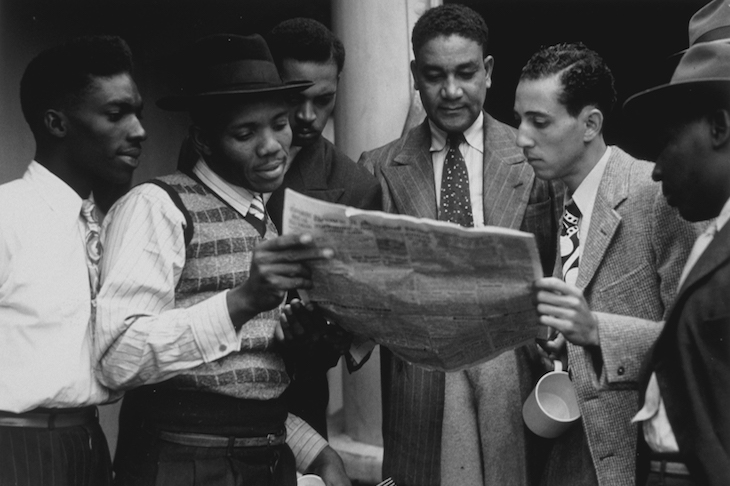This ‘Windrush’ story comes from a friend called Michael McKay, a British broadcaster based in Geneva. His father, Jeff, a Jamaican, joined the Royal Electrical and Mechanical Engineers in 1941. He sailed to England, and served in Montgomery’s army in Egypt. Michael’s mother, Pearl, already in love with Jeff, joined the WAAFs in Jamaica and came over to find him. She was eventually stationed at RAF Melksham. They married shortly after VE Day. When they returned to Jamaica, Jeff could not get his pre-war job back. In 1948, Michael was born. In 1949, they took the boat to England. Kind white wartime friends of Pearl invited them to share their small house in Glastonbury. Jeff got a job in Clarks, the shoemakers, and the couple had two more children. Because of his war service, they quite quickly got a council house, in view of Glastonbury Tor. In 1968, seeking a passport to go to Berlin with his college athletics team, young Michael was told he needed a Certificate of UK Citizenship by Registration because of his Jamaican birth. He was told to contact ‘his’ High Commission in London, even though Jamaica was not an independent country when he left: he had arrived in England as a British subject. No one had ever said he needed papers. Until this point, his parents had never considered whether they were Jamaican or British. Both descriptions were part of the one ‘imperial family’. His passport problem became theirs too. They were distressed at having to choose. The local bank manager, the Catholic priest and the mayor of Glastonbury rallied round and vouched for Michael. He got his British passport quickly. Attached was a compliments slip from ‘the under-secretary of the Home Office’, on which an official had written ‘I only do this for the McKays! Happy Holiday’. The official was called McKay. This story and its nuances illustrate how people felt.
Fifty years ago, ‘les événements’ kicked off in Paris. The students’ complaints were fascinatingly trivial. They were bored stiff at their hideous new university in Nanterre. In a move which would now get them trolled by Time’s Up, the left-wing male students organised a ‘sexual riot’ and marched on the girls’ hall of residence, demanding to be let in. The authorities panicked, and closed the campus, so the students occupied the Sorbonne. Within weeks, strikes and riots threatened to bring down the French government. The BBC rightly reminds us of those May days, but what of the sequel? Tell us, please, of President de Gaulle’s ambiguous, theatrical flight to the French army headquarters in Baden-Baden (‘The State will be where I am… I want to plunge the French people, including the government, into doubt and anxiety in order to regain control of the situation’); and of his extraordinary broadcast to the nation when he returned the next day: ‘Françaises, Français, as the possessor of national and republican legitimacy, I have considered over the past 24 hours all the eventualities… I shall not withdraw. I have a mandate from the people and I shall fulfil it.’ The next evening, a pro-de Gaulle crowd of more than half a million — far larger than the student or communist demonstrations of previous weeks — filled the streets of Paris. Republican legitimacy, and a 78-year-old genius, prevailed.
Following my suggestion (see last week’s Notes) of a scheme called Preach First to increase the number of priestly vocations, I discover that the Church of England quite recently started the Ministry Experience Scheme, and it expects to recruit 150 entrants this year. Each person enters for only a year, in more junior aspects of ministry than I was thinking of, without vows. Forty-six per cent of those taking part last year went forward to the selection conference for the priesthood, so it clearly appeals. I do realise that my temporary priesthood idea is probably heretical. But I raise it to make people think more about what is stopping vocations. Isolation must be one factor. It is so much harder to go where few others venture.
The Times’s internal guide to writing its obituaries has fallen into my hands. It adds new terrors to death. Questing after interest (‘the quirkier the better’), it invites obituarists to ask unusual questions about the dead: ‘Were they cold-hearted bastards in the workplace?’ ‘Did they enjoy baiting their neighbour’s dog and teaching their grandchildren to smoke?’ It also advocates ‘the gentle saying of the opposite of what is meant… If, for example, we say that the wife of XXXXX [here it names a well-known politician] “definitely was not once a high-class prostitute”, British readers would assume she definitely was’. The most entertaining obituaries ‘treat their subjects as if they were fictional characters’, we are told. There follows a long list of recommended euphemisms to describe various faults and foibles. These include ‘He had an uncompromisingly direct way with the opposite sex (flasher)’ , ‘She believed in hands-on mentoring (affairs with junior colleagues etc), ‘He believed in old world values (wanted to bring back the birch, especially for members of the LGBT community)’, ‘She was active in local affairs (busybody)’ etc. Relations of the deceased are a nuisance, apparently, because they want ‘to protect the family’s narrative’, but worth talking to because ‘the telling details can be teased out of spouses and children too’.
The Times guide’s advice is not all wrong; but the subjects of this arch joshing are not fictional characters. They are real people who have just died. Surely the full accurate facts of the person’s life, fairly assessed, must come first, in the interests of record. Nowhere in the Times guide are these insisted on. I am biased, of course, but if your distinguished loved one is on the way out, I suggest you avoid the Times extracting ‘telling details’ from your children for its merciless merriment, and tip off the kindly obituaries desk of the Daily Telegraph instead.







Comments